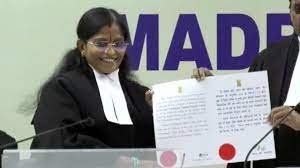CJI Chandrachud has queried to what extent an individual’s history of engagement in political activities should impede their appointment as a judge. He recently affirmed that the Supreme Court Collegium thoroughly vetted Justice L Victoria Gowri before recommending her as a judge to the Madras High Court.
CJI Chandrachud further asserted that a lawyer’s representation of political interests does not invalidate their potential judgeship. “Lawyers, throughout their practice, advocate for a diverse clientele. They do not pick their clients. In my belief, much like doctors are duty-bound to treat those who seek their help, lawyers should represent those in need of legal assistance without presupposing their guilt or innocence,” CJI Chandrachud explained.
He also invoked the example of Justice VR Krishna Iyer to underscore his point. “Justice Krishna Iyer, one of our most esteemed judges known for his landmark rulings, had political ties,” noted the 50th CJI.
Justice Gowri’s promotion was contentious due to her alleged ties to the Bharatiya Janata Party (BJP) throughout her legal practice. An unofficial Twitter profile, reportedly linked to Gowri, identified her as the National General Secretary of the Bharatiya Janata Party Mahila Morcha. Her pointed remarks about Islam and Christianity, available on YouTube, also sparked significant debate.
On October 21, CJI Chandrachud spoke at Harvard Law School’s Center for Legal Profession. There, he faced a question about “the Collegium’s inability, at least administratively, to retract that recommendation.”
Responding, CJI Chandrachud stated, “The question suggests that the Supreme Court did not fully address the issue after it came to light,” “That would be a somewhat inaccurate portrayal.”
To clarify, he added, “We scrutinized everything with utmost diligence. Particularly, the remarks that the judge allegedly made at a certain time were examined with great detail. One standard procedure of the Collegium is to seek a report from the Chief Justice of the High Court.”
CJI Chandrachud mentioned that the Collegium, after a detailed review, will relay any lingering questions to the Chief Justice of the High Court concerned with the nomination.
“We reach out to the Chief Justice of the High Court, alerting them to the issue once again. Can you furnish a succinct report on the veracity of these claims? We request their insight and present whatever we receive to the government.”
He noted that the appointment process also involves the state and central governments and an Intelligence Bureau (IB) check.
“The judge appointment procedure is quite intricate, involving various layers of the federal structure, state governments, the Union, and investigative bodies such as the Intelligence Bureau, which conduct background checks on the individuals,” CJI Chandrachud elaborated. The Chief Justice observed from personal experience that lawyers who have represented a wide range of political views have often become excellent judges.
He reflected, “I’m not convinced that we should hastily judge someone based on the opinions they may have held as lawyers. Our judicial profession, I believe, has a transformational quality. Upon taking office, whether it’s through peer learning, judicial training, or experience, something about being a judge seems to foster, or at least should foster, an impartial approach to their work, their interactions with colleagues, and their dealings with the bar,” CJI Chandrachud concluded.



